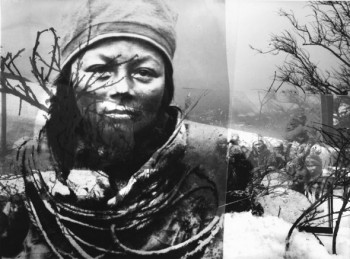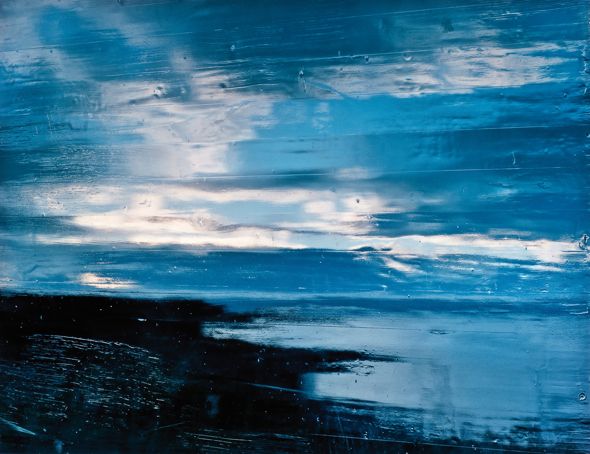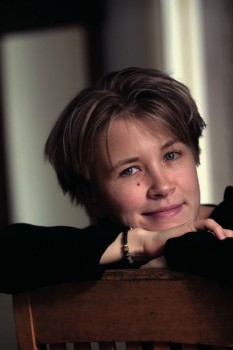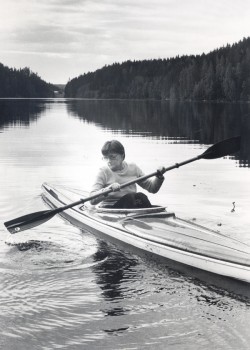Search results for "Что такое нейролингвистическое воздействие больше в insta---batmanapollo"
The monster reveal’d
31 March 1997 | Archives online, Fiction, Prose
Extracts from the novel Frankensteinin muistikirja (‘Frankenstein’s notebook’, Kirjayhtymä, 1996). Ern(e)st Hemingway and Gertrud(e) Stein – the narrator in these extracts – meet the famous creature in Paris. According to Juha K. Tapio in this, his first novel, Mary Shelley’s monster has been leading an interesting life during the past few centuries
My first impression was that there wasn’t anything particularly monstrous about him. I have already said that his age was hard to determine, but there was something about him that tempted one to apply the word ‘elderly’ to him. He was up in years, no doubt about that, but in a rather special, indefinable way – which made it hard to infer, at least from his outward appearance, what stage he had reached in terms of normal human life. It had to do with something outside of time. He was tall and a little more raw-boned than the average person, and this made one wonder, looking at him, what kind of body his very fashionable clothing concealed his suit and tie conformed to the latest style. This was certainly not the misshapen and monstrous creature I vividly remembered from Mary Shelley’s description.
It was obvious that the past decades had brought about an inevitable evolution. More…
Icy prospects
8 October 2010 | This 'n' that
Photographer Jorma Puranen (born 1951) has long been concerned with nature and the representation of northern landscapes, particularly Lapland, as well as light and its reflection.
One of his most famous projects is Imaginary Homecoming. In the 1990s, on a visit in the Musée de l’Homme in Paris, he found some old archive boxes full of glass negatives. They were ethnographical images of the Sámi, taken by G. Roche, employed by the French Count Bonaparte on an expedition to Lapland in 1884.
Puranen took them back to the wildernesses of Lapland and photographed them once more in their native surroundings, where they became a photographic installation in the tundra. He published them in his book Kuvitteellinen kotiinpaluu / Imaginary Homecoming (Pohjoinen, 1999).
Puranen’s 2006 series Icy Prospects explores landscape: the large pictures are made by painting wood with black gloss paint, reflecting the landscape on the wood and photographing the reflection.
Snow, ice, water, sky and trees are portrayed the way that brings Impressionism to mind, as Liz Wells writes in her introduction in the book entitled Icy Prospects, published by Hatje Cantz (Germany, 2009).
A new exhibition of Jorma Puranen’s work from 1992 to 2010, at EMMA, the Espoo Museum of Modern Art, opened on 29 September; it runs until 9 January 2011. Partly retrospective, it features Puranen’s techniques of chromogenic colour and black and white photography, showcasing his highly original style.
Lest your shadow fade
31 March 1987 | Archives online, Fiction, Prose
An extract from the novel Jottei varjos haalistu (‘Lest your shadow fade’, 1987). Interview by Erkka Lehtola
‘… learn, then, to like yourself.
Dancing beside your shadow, laugh and play.
Dance always in the sunlight, lest your shadow fade.’J. Fr. Erlander, 1876 (Erika Kuovinoja’s grandfather)
‘Tis in life’s hardness that its splendour lies.’
J. Fr. E., 1890
Three days before the date fixed for the funeral, the minister directed his steps towards the home of the deceased, trying, as he walked, to compose his thoughts, which were full of righteous Lutheran anger. There were many good reasons for this. On the other hand, nothing that had happened in the past ought to make any difference, now that he was on his way to visit a house of mourning. A visit that called for the exercise of understanding, and even, if possible, kindness. It was a lot for anyone to expect, even of a clergyman. It was not by his own desire that he was paying this call: it was a matter of duty. And this time he was the protagonist. Petulantly, his shoes crunched the gravel. More…
Becoming father and daughter
31 December 1990 | Archives online, Fiction, Prose
A father kidnaps his 10-year-old daughter and flees to the western extremity of Europe, to Ireland, to begin a new life under new names. In the following extract, the girl is in a state of shock after witnessing an event organised by a religious sect in which animals are driven over a cliff to their death. The year 2000 approaches, and with it clarification of the relationship between father and daughter. An extract from Olli Jalonen’s novel Isäksi ja tyttäreksi (‘Becoming father and daughter’). Introduction by Erkka Lehtola
He begins leading his daughter back the way they came, along the hillside and the lip of the precipice.
The blare of the Legion’s display carries far, till finally the voices are scrambled in the bluster of the wind. The electricity crackles in the loudspeakers, and the thundersheets rumble out to the audience. ‘Be silent!’ come the roars from the plat form: ‘And look at each other! Each is fearfully following his way, each is a venue of good and evil, each is inscribed with God’s name!’ More…
Second nature
15 February 2010 | Articles, Non-fiction
 We hear a lot about how the internet is going to transform the reading and the marketing of books. But what about the act of writing? Teemu Manninen reports from the frontline of a new generation of authors for whom life has always been digital
We hear a lot about how the internet is going to transform the reading and the marketing of books. But what about the act of writing? Teemu Manninen reports from the frontline of a new generation of authors for whom life has always been digital
When we think of the future of publishing in these times of electronic reading devices, audiobooks, and the internet, when it seems as if the whole material being of literature is about to be transformed, we may ask how the marketing of books will change.
What happens when publishing goes online? How will authors cope with the new culture of the internet? More…
Cruising
30 September 1993 | Archives online, Fiction, Prose
An extract from the novel Vieras (‘The stranger’, Otava 1992). Introduction by Pekka Tarkka
I lay there for a moment, motionless, eyes closed.
The bunk was damp. It felt damp around my thighs; I slid down lower – and there, it was really wet.
My sleeping bag was obviously soaked, and that meant that the mattress was soaked, too. Oh, rats. I couldn’t imagine having wet myself. Or – worse – had the boat sprung a leak, the water already rising up to the floorboards? I bounded to my feet: the rugs were dry. So was the cabin floor. I raised the boards, peered down: two fingers of water in the forward bilge, as usual. So, where the –? In the course of yesterday’s rough sailing, some water had seeped in below the windowframe. No more than a cupful, but it had trickled down inside the panel and then onto the mattress. I tried the other side of the bunk. It was dry. Well, I would just have to pick up the mattress and set it on its side. More…
Practically public
31 December 2002 | Archives online, Fiction, poetry
Poems from Koko tarina (‘The whole story’, Tammi, 2002). Introduction by Anselm Hollo
Pan shot
A whitewashed wall, small windows
advent calendar peepholes at the end of darkness,
lit-up squares
One two three kitchens awake at 7
each tenant bends over a kettle of porridge
in the gurgling coffeemaker’s soundscape,
opens the refrigerator
see the hunter in action: let’s spear this yoghurt
and the building across the way testifies to all of this
practically public activity
the evening’s closure of curtains, turnings-off of the light,
nocturnal breastfeedings. Talking windows. A light comes on at: 2:54 AM
– what’s up now?
Is someone thinking about a bird she encountered at the cemetery? More…
For love or money
30 June 1994 | Archives online, Fiction, Prose
Extracts from the novel Paratiisitango (‘Paradise tango’, WSOY, 1993). Introduction by Markku Huotari
The bishops’ dilemma
They are waiting for Blume in the front room of the office. On the sofa sits a man whom Blume has never learned to like. He himself chose and appointed the man, for a job not insignificant from the point of view of the company. Blume has good reasons for the appointment. If he employed only men he liked, the business would have gone bankrupt years ago.
Reinhard Kindermann gets up from the sofa and waits in silence while Blume hangs up his overcoat. Mrs Giesler stands next to Blume. She does not try to help her superior take off his coat, for she knows from experience that he would not tolerate it, but the old man does allow her to stand next to him and wait in silence, like a servant expressing submission. More…
In the wars
31 March 2005 | Archives online, Fiction, Prose
A short story from Jussi ja Lassi (‘Jussi and Lassi’, WSOY, 1921). Introduction by Pekka Tarkka
One winter evening, Lassi, who was six, asked: ‘Can’t we go out, mother?’
‘It’s late already,’ she said.
‘We’ve been inside the whole day practically,’ said Jussi, who was seven. ‘It gets on my nerves.’
‘Gets on your nerves, does it? Well, boys, you’ll soon be off in bed,’ she said, ‘so you won’t need to get nervy.’
‘Not off to bed – not yet, it’s not yet, not…’ Lassi broke off, trying to work it out.
‘It’s not six yet,’ Jussi said.
‘No, it isn’t,’ their mother said; ‘but you’ll have to stay in your room and not go charging about here, because visitors are coming.’ More…
Slow down!
26 August 2011 | Letter from the Editors

Books for a desert island? Photo: Patrick Verdier (Wikimedia)
Might Tolstoy’s War and Peace be the epitome of a novel that qualifies for reading on a desert island? (Maybe along with Tristram Shandy or Finnegan’s Wake, and possibly The Gateless Gate (the Zen Buddhist kōans). After all, who’s got time or energy for some 1,500 pages of a wartime story from the Napoleonic era with too many characters (580, and so many of them called Pierre)?
We do tend to consume everything quickly: busy busy! We eat fast, we talk fast, we exercise fast, we fast-forward through movies. We devour books like fast food. Hurry hurry! On to the next one, whatever it is, don’t hang about! More…
One more time
31 December 1999 | Archives online, Fiction, poetry
Poems from Kun elän (‘As I live’, Tammi, 1999). Introduction by Pekka Tarkka
XI
Here is a treetop
with three
thousand branches,
three thousand
names, whose
syllables no one
knows, three
thousand minds,
one murmur
traversed by a
breath, a sentence,
I’m afraid to say
anything,
a million leaves
sough, speechless,
a thousand dark
branching roots,
names in the soil,
a million words
in humus heaven
a thousand sprouts
bloom yet are lifeless,
dead heroes,
pointless tales,
three million
wrinkles. faces
obscured
by branches,
in the brain’s roots
a new person’s thought
is born and
hums through branches,
roots,
the smoke disappears
through the branches,
the smoke disappears.
XVIII
He saw faces behind the glass,
heard himself breathe.
With his fingertips, he brushed the glass surface
but it was not the same as skin.
Slowly, he arranged what he saw,
that blurry motion, but it did not work
as an architecture, the kind
a living city is perennially building.
He opened up to a gaze, froze,
lost the game altogether.
Then the scythe disappeared. He opened
a window onto the street, heard
leaves rustle as if waking up
to life, one more time.
Intermission
But I did not sing,
I chased her away,
flushed the toilet, paced
circles in the living room
like a moth that looks for
a place to land
or a solution that does not exist
to a problem that probably
does not exist either,
just a wall full of
leather-backed books
and seats among which
the moth chooses one, a
commodified insomnia
a landscape someone
invented once: palaces,
persons, tensions,
systems and maps
constructed by language insects
on top oft he void,
in the air, an imago mundi
never seen before
never before heard-of
utopias, illnesses
people prefer to endure
rather than
giving up, once they have
forgotten the war’s causes
or the cornerstone of their learning
ground up to gravel
long ago, they still love
the country they have
destroyed, for love
is stronger than
its object, and who
needs it, the group
eats reason and everything learned,
it turns us into beasts,
the congregation executes
its christ, the state
its sages, but the sleepless
animal keeps wrestling
in the mud with its inner
hero, the beast; yearns, spits,
rages and grieves, looks for
reconciliation, tries
to mediate and interpret
between invisible enemies
to whom only sleep and murmur
can lend a shape, until the image
finally shatters
into sentences, steps
into line between covers,
on the shelf: in the closed pages
simmers yet another delirium
no one has ever seen before.
Four o’clock
Don’t know why I burst out laughing
in bed, but someone instantly answered
as if by rote, as if
comprehending eternity,
laughing without malice, life
and soul of the party, cruel
as a certain hero
who was asked to hold up
the roof while they were still making
speeches in the hall, while the fool
scratched his belly, raised his cup
to the host. while a woman
raised her skirt, the whole forest laughed
and every demon claw
inscribed history. from which
the laughter freed him.
All of a sudden the clock struck four,
but I heard only my heartbeat,
the rush of systole and diastole,
tides of a muddy delta,
the sleepless whimper
of birth and death, the streams of cellular fluids,
the pulsing of stars, the animal’s paws
as it padded along the runner,
all in step; not long now until the wolfs hour,
nothing stirred on the plains, I felt
a thundercloud push down on my forehead,
and the wind died, the grass
stopped rustling, sugar coagulated, and then
lightning stopped my heart with one blow,
in one rapid motion my hand
tore off the pillow case, my body
sat up in bed, my mouth shouted,
the primal animal, evolution howled.
Upright. he stood in front of me,
in the rearview mirror the car came closer
struck me again and again from behind
with a huge iron fist, made words burst
from my mouth, the car rose into the air: a plane,
a pegasus galloping straight at the pillar,
now muteness, the windshield
cracked, flew out in one piece
to rest on the hood
in the rearview mirror the car
came closer again, I saw how I flew
into the foliage, in my mind
two separate memories:
thus memory shatters time, and so
one can look at the past as true,
barely, barely endure it: she
bent over me, said something.
At the wake, lips moved. behind
the glass stood a fair boy
whom I knew, even though
he had already grown up to be a man.
Translated by Anselm Hollo




